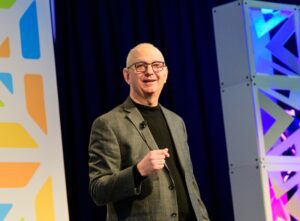Who is a member?
Our members are the local governments of Massachusetts and their elected and appointed leadership.

Keynote speaker Matt Lehrman explains how communities can foster civility and community engagement around difficult topics during Connect 351 on Jan. 25 in Boston.
In order to foster civility and community engagement, municipal leaders must help people feel included and heard, rediscover core community values, have “courageous conversations,” and hold space for disagreement.
These were key points offered by facilitator and podcast host Matt Lehrman in his Saturday keynote presentation during Connect 351 on Jan. 25 in Boston.
In his talk, “From Conflict to Conversation,” Lehrman shared insights from his experience as cofounder and managing director of Social Prosperity Partners and from working with municipalities around the country to build consensus around contentious issues.
Walking onstage to the Beatles song “We Can Work It Out,” Lehrman told local leaders that they need to embrace courage — but not the kind that exists on a battlefield or that prompts people to stand their ground.
“The kind of courage that I care about is leaning into the idea that you can listen to someone with whom you disagree,” he said, “And instead of dismissing them, instead of calling them nasty names, to say the words, ‘Tell me more — help me understand where you’re coming from, help me understand what combination of education or life experience or divine creativity makes you see this issue in that way.’”
Since 2012, Lehrman has worked with municipal, civic and nonprofit organizations to improve public engagement, build consensus and undertake strategic planning. A year ago, he launched the “Community Catalysts” podcast, where he interviews leaders who are transforming their communities. He said communities call him to help them make difficult decisions “without everyone being at each other’s throats.”
Lehrman compared the governing process to a coffee maker, saying that residents come in with their opinions, ideas, stresses, long memories and grudges — which is OK, and part of the dynamic.
“They dump all that into this filter, this coffee pot of local governance,” Lehrman said. “What is it that they want out at the end?”
He asked the audience to answer the question: “How should people feel about their civic engagement? … How do they deserve to feel? How would they want to feel? This is where you get to put your empathy in place.”
Audience members texted answers that were displayed on screens onstage. While they said they want civic engagement to make their constituents feel emotions such as heard, respected, included, and excited, civic engagement actually makes people feel everything from energized and empowered to frustrated and divided. Lehrman said that duality is inherent in human society, and municipal officials must help people navigate the duality to solve community problems.
“When you took the oath of office that you were elected to or that you were appointed to, when you were hired to staff, in whatever capacity you were taking, you became the owners of the process of enabling people to join together,” he said. “Yes, there are times when you are called upon to be the decider, but most of the time you are called upon to help people join together. That is our leadership imperative.”
Lehrman urged leaders to embrace their communities’ core values. He reminded people of the value expressed in the Pledge of Allegiance, as one nation “indivisible.” He asked audience members who belong to Rotary International to recite their ethical guideline, the “Four-Way Test,” and asked municipal leaders to share their values. Newton Mayor Ruthanne Fuller recited the words from her city seal, “Liberty and Union,” and Waltham City Councillor Robert Logan recited the Boy Scout Law.
“If you want to bring people together, if you want to find agreement, we have to go back to core values,” Lehrman said. “We have to go back to understanding, what is it that brought us together in the first place?”
In bridging the gap between actions and values, Lehrman described how the City Council in Cavalier, North Dakota, overcame its members’ reluctance to read constituent email by voting on a new set of values, ones that emphasized communication, community engagement and responsiveness.
And while it makes public officials uncomfortable, Lehrman said, “disagreement isn’t just natural, it’s necessary.”
The First Amendment guarantees freedom of speech, but doesn’t require that speech to be nice. And he said the unpleasantness reflects that “sometimes the playing field isn’t level, because people have been excluded, because they don’t trust that the system is working for them, that they’ve never gotten a chance to be heard.”
Lehrman urged leaders to go beyond the required public process, to find additional outlets to engage with residents over challenging issues — to have those “courageous conversations.”
Officials in Goodyear, Arizona, drive around a “Topics on the Move” vehicle and encourage residents to write their ideas, thoughts and concerns as graffiti on the outside of the vehicle, while photographing their comments for all to see. Lehrman also discussed helping a community transform a public outreach effort about fire protection, by minimizing presentations and maximizing conversation.
Even as the nation is increasingly divided, Lehrman urged local leaders to “keep your community indivisible.”